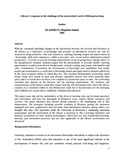| dc.description.abstract | With the constantly unfolding changes in the educational horizon, the survival and relevance of
the library as a repository of knowledge and provider of information services can only be
assured in being proactive, swift and responsive. Lifelong learning targets the improvement of
“knowledge, skills and competence, within a personal, civic, social and/or employment-related
perspective”. It strives to provide learning opportunities on an on-going basis, among others, to
the marginalized, isolated, underprivileged and the unreachable. It provides further learning
opportunities to adults from diverse backgrounds, already working and people with families and
other commitments. It promotes the development of knowledge and capabilities that enable people get accustomed to a world that is knowledge based and equip them to function effectively
in the socio-economic milieu in which they live. The resultant liberalisation of learning which
brings along such system as open and distance education ensures that where learning takes
place and is accessed does not have to be confined to a particular place or time. The controlling
variables may depend on the learners and the learning requirements. The swiftness and
responsiveness of the library would then require that the old stereotyped order where the library consults or is consulted within its own limited four walls has to be jettisoned, for the emerging and workable new system that is redefined, reshaped and refocused. This paper notes that all the stakeholders of this form of learning who can be found anywhere and everywhere, and may live thousands of kilometres away, require library resources and
services. The paper discusses how library should respond to the challenging role in this dispensation. The strategies including possible coalition of libraries, getting the customers
equipped with such competencies that will make them information literates, among others, are
brought into play. The experience from the University of Botswana’s continuing education
programmes and the involvement of the library is factored in. The e-learning initiatives and
immense possibilities of other modern technologies, which have not only transformed teaching, learning and interaction processes but are also applicable in the library environment are
discussed. | en_US |

